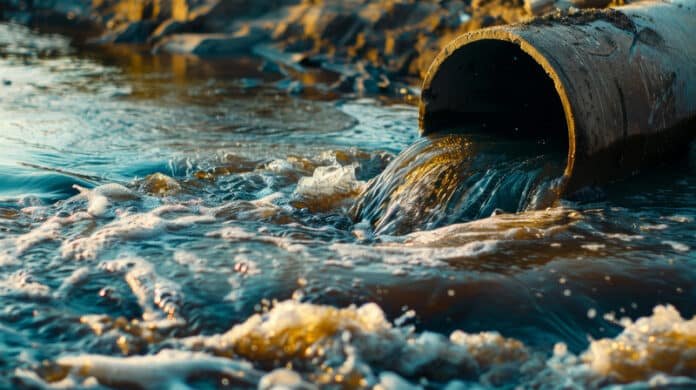Several water firms in England have been found to have “passed” thousands of pollution tests that, in reality, were never carried out. The discovery stems from an investigation conducted by the newspaper The Observer, which uncovered that several sewage plants reported compliance with environmental regulations despite tests not taking place at all.
The water firms’ own operational data reveals that sewage outflows at certain plants ceased — sometimes for just a few hours — on days when tests were scheduled. As a result, the Environment Agency’s self-monitoring system allowed these “no-flow” incidents to be classified as compliant, despite there being no evidence to support that the water quality standards were being met.
One company, Southern Water, has previously been caught deliberately manipulating effluent flow data to avoid detection of pollution violations. After an investigation into its operations, the number of no-flow events the company reported dropped significantly. This issue highlights a deeper problem within the water sector’s self-monitoring system, which allows water companies to conduct pollution tests with minimal oversight. Critics argue that this system is ripe for manipulation and needs urgent reform.
The “no-flow” events refer to times when sewage outflows — which are supposed to be sampled to check pollution levels — temporarily stop. In these cases, the self-monitoring rules allowed the sewage plants to report compliance, as long as the sampling staff confirmed that no flow occurred. Despite this, environmental campaigners and experts argue that these incidents should be closely scrutinized and that no-flow events should not be considered as automatic proof of compliance. In many instances, previous tests had already suggested the plants were either at risk of breaching or had already breached their environmental permits.
Peter Hammond, a spokesperson for the campaign group Windrush Against Sewage Pollution (Wasp), analyzed no-flow data from 2021 to 2023 and found several examples where sewage plants were deemed compliant without any testing. Hammond believes these incidents need further investigation and is calling for an overhaul of the self-monitoring system, arguing that water companies should not be allowed to mark their own homework.
The problem dates back to 2009, when the government introduced the operator self-monitoring system. Under this scheme, water companies were allowed to take their own pollution samples, in addition to the audits performed by the Environment Agency. The samples were meant to verify whether the treated effluent met the conditions set out in the companies’ environmental permits. The self-monitoring system was designed to ease the burden on the regulatory body, but it has resulted in several major issues. One of the most concerning is that water companies are often able to predict when tests will be carried out and time their operations accordingly. This allows them to avoid pollution detection by scheduling no-flow events on sampling days.
In 2019, Southern Water was fined £126 million by the regulator Ofwat for breaches of its license, including the manipulation of no-flow events. It was revealed that the company had deliberately engineered no-flow incidents on sampling days to prevent its sewage plants from being flagged for pollution violations. Ofwat noted that Southern Water’s practice of manipulating no-flow data resulted in false information being provided to both the Environment Agency and Ofwat. In addition, this manipulation allowed the company to avoid potential price review penalties totaling £75 million. The scandal led to a major overhaul of the company’s procedures.
After Southern Water came under scrutiny, the number of no-flow events it reported dropped from 124 in 2017 to just 12 in 2018. However, between 2021 and 2023, around 120,000 samples were taken at sewage plants across England. Of those, approximately 5,000 were reported as no-flows. While not all no-flows are the result of manipulation, the lack of consistent and effective oversight has raised questions about the credibility of the self-monitoring system. Wasp has identified 18 instances of no-flows between 2021 and 2023 at 14 plants, involving seven different water firms. In these cases, no samples were taken on the designated sampling days, even though previous tests had indicated that the plants were likely to breach environmental standards.
While water companies insist that no-flows can occur for legitimate reasons, such as blockages, power cuts, planned maintenance, or intermittent flows, the fact that the number of no-flows can be easily manipulated remains a concern. Water firms have argued that strict safeguards are in place to prevent abuse of the self-monitoring system. However, critics point out that these safeguards are not sufficient to prevent deliberate manipulation.
The Environment Agency is currently conducting its largest-ever criminal investigation into potential non-compliance by water companies. The investigation is focused on ensuring that water firms meet their obligations to protect the environment and public health. In addition to the investigation, the agency is recruiting up to 500 additional staff to improve the enforcement of environmental standards.
In December 2023, Professor Carolyn Roberts filed collective actions in the Competition Appeal Tribunal against six water companies on behalf of an estimated 20 million natural persons who have made payments to the water companies for sewerage services. She is seeking £800 million in damages.
Professor Roberts, serving as the Proposed Class Representative (PCR) in each case, asserts that the six water companies have breached competition law by providing misleading information to the regulators regarding the frequency of pollution incidents they have caused.




